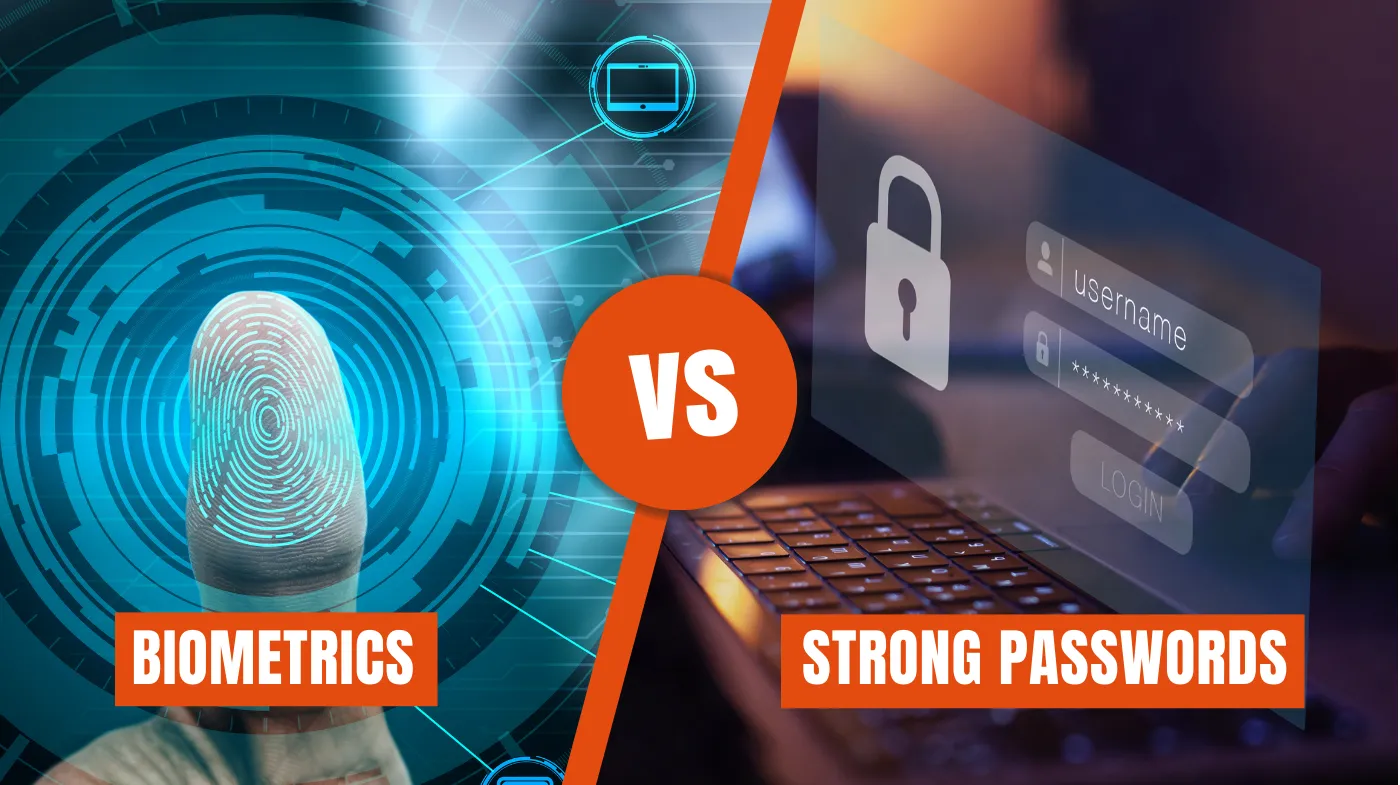
As you consider how to secure your online accounts and sensitive data, you may wonder whether biometric authentication or a strong password is the better choice. Both offer valuable security features, but they also come with their own pros and cons.
Biometric authentication, for example, offers unparalleled convenience and is harder to compromise, as your fingerprint or face is unique to you. However, it raises privacy concerns since once compromised, biometric data cannot be changed.
On the other hand, strong passwords are flexible and can be easily updated if needed, but they are still vulnerable to attacks if not managed properly.
In this post, we will discuss the advantages and disadvantages of both security methods, so you can make an informed decision on which is best suited for protecting your sensitive data.
Advantages of Biometrics
Biometrics offers significant advantages over traditional passwords. Below are the key benefits you should know:
Harder to Compromise
Authentication methods have evolved considerably, and one of the standout features of biometrics is its difficulty to compromise. Unlike traditional passwords, which can be stolen, guessed, or cracked, your biometric data --- such as fingerprints, facial recognition, or iris patterns --- are unique to you.
This uniqueness provides a significant security advantage, making it far more challenging for unauthorized individuals to replicate or access your biometric identity.
As a result, biometrics serve as a highly secure authentication option, reducing the risk of identity theft and unauthorized access.
Convenience
In today’s fast-paced world, the convenience of biometric systems stands out as a significant advantage over traditional passwords. You can quickly authenticate yourself with a simple scan of your finger or face, eliminating the need to type in complex passwords.
This streamlined process not only saves time but also reduces frustration, as you no longer have to remember multiple passwords or worry about forgetting them.
Phishing Resistance
How can you guarantee your sensitive information remains secure in an era of rampant phishing attacks?
Biometrics provides a robust defense against such threats. Unlike passwords, which can be easily stolen through deceptive emails or counterfeit websites, your biometric data, such as fingerprints or facial recognition, cannot be “fished” from you.
This intrinsic characteristic makes biometrics a far superior option for protecting your credentials. By relying on unique physiological traits, you greatly reduce the risk of unauthorized access, ensuring that your sensitive information remains in safe hands.
Increased Security
While traditional security measures can be effective, they often fall short in today’s digital landscape, where the stakes are higher than ever.
Biometrics enhances security by providing a unique identifier that’s nearly impossible to replicate. When combined with strong passwords, you create multi-factor authentication (MFA), considerably reducing the risk of unauthorized access.
This layered approach guarantees that even if a password is compromised, your biometric data serves as an extra barrier.
Using biometrics with other methods boosts your security and helps you stay ahead of new threats, smart protection for sensitive data.
Disadvantages of Biometrics
While biometrics offers convenience, it also introduces several concerns that you should carefully consider, such as:
Privacy Concerns
As biometric data becomes increasingly integrated into security systems, the privacy concerns surrounding its permanence can’t be ignored.
Once your biometric information, like fingerprints or facial scans, is compromised, there’s no way to change it. Unlike a strong password, which you can easily update, your biometric identifiers are fixed and irreplaceable.
This raises significant issues regarding identity theft and unauthorized access. If hackers obtain your biometric data, they hold a permanent key to your identity.
The potential for misuse is alarming, leading many to question whether the convenience of biometrics is worth the risk to your privacy and personal security.
False Positives and Negatives
The permanence of biometric data raises concerns not just about privacy but also about the reliability of these systems.
While rare, biometric systems can produce false positives, incorrectly identifying someone as an authorized user. Conversely, false negatives can prevent legitimate users from accessing their accounts, leading to frustration and potential security breaches.
Unlike strong passwords, which undergo straightforward verification processes, biometric systems’ complexity introduces these risks.
You might find yourself locked out due to an unrecognized fingerprint or face, raising questions about the overall effectiveness of biometrics as a secure authentication method.
High Implementation Costs
Implementing biometric systems can quickly become a significant financial burden for organizations, especially when considering the initial investment and ongoing maintenance costs.
You’ll need specialized hardware and software, which adds to the upfront expenses. Unlike password-based security, where you can utilize low-cost solutions like password managers, biometric systems often demand much higher financial commitments.
Additionally, the costs of maintaining and upgrading these systems can escalate, making them less appealing for budget-conscious organizations.
Potential for Coercion
While biometric systems offer advanced security features, they also introduce significant risks, particularly concerning the potential for coercion.
Unlike strong passwords, which you can safeguard and keep private, biometric data like fingerprints or facial recognition can be extracted under duress. This vulnerability is especially pronounced in high-risk situations, where attackers may force you to provide access.
Once your biometric data is compromised, it can’t be changed, unlike a password. This permanence magnifies the threat, making it vital to reflect on the implications of coercion when evaluating biometric security against traditional password systems.
Advantages of Strong Passwords
Strong passwords offer significant advantages when it comes to securing access across devices and platforms, such as:
Flexibility
When it comes to flexibility in authentication methods, strong passwords stand out because they can be utilized across virtually any device or platform.
You’re not dependent on specific hardware or software to authenticate yourself, which means you can access your accounts from various settings---be it a personal computer, smartphone, or public terminal.
This universality allows you to maintain control over your security without worrying about compatibility issues.
Changeability
The ability to change your authentication method greatly enhances security, and this is where strong passwords excel.
Unlike biometric data, which remains static and potentially vulnerable if compromised, you can easily alter your strong passwords at any time. If you suspect a breach, you can quickly generate a new, robust password to secure your accounts without needing specialized devices or software.
This flexibility in changeability not only empowers you to respond swiftly to threats but also allows you to customize your security based on evolving risks, ensuring that your accounts remain protected against unauthorized access.
Compatibility
While many security methods require specific hardware or software, strong passwords offer a universal solution that seamlessly integrates with virtually any account or device.
You don’t need extra equipment or specialized systems, making it easy to implement across platforms. This compatibility guarantees that you can protect your accounts regardless of the technology at hand.
Furthermore, tools to check password strength are readily available, allowing you to verify that your chosen password meets security standards without much hassle.
This ease of use and broad applicability underscores the practicality of strong passwords in today’s diverse digital landscape, proving their reliability in safeguarding your information.
Disadvantages of Strong Passwords
While strong passwords offer a layer of security, they also come with significant drawbacks, such as:
Vulnerability
Even the strongest passwords can fall victim to vulnerabilities if they aren’t crafted with care. If you create passwords that are weak or reused, you’re opening yourself up to brute-force attacks.
Attackers can exploit these weaknesses, systematically guessing your passwords until they gain access. To mitigate this risk, consider using a reliable strong password generator that creates random, complex passwords. This approach greatly decreases the likelihood of unauthorized access.
User Behavior
Creating and managing strong passwords is often a challenging task for users, resulting in behaviors that can compromise security.
Despite the convenience of password managers, many still struggle to generate and recall complex passwords. This frustration can lead you to adopt insecure practices, like reusing passwords across multiple accounts.
When you reuse passwords, a breach in one account can jeopardize others, creating a domino effect of vulnerabilities. Additionally, you might resort to simpler, easily guessable passwords, further undermining your security.
Password Fatigue
As you juggle numerous online accounts, password fatigue can set in, making it increasingly difficult to maintain strong security practices. You might find yourself overwhelmed and resorting to poor habits, like writing down passwords or opting for simpler, easier-to-remember ones.
These shortcuts considerably reduce your security, exposing you to risks like account breaches and identity theft. The more accounts you manage, the greater the temptation to simplify your password strategy.
To combat password fatigue, consider using password managers or adopting two-factor authentication, which can help you maintain robust security without the mental burden of remembering complex passwords for every account.
When are strong passwords still necessary?

Strong passwords are still essential in several scenarios, even with the rise of biometric authentication. They serve as a reliable backup when biometric systems fail or are unavailable.
You don’t want to be locked out just because your fingerprint scanner isn’t working. In multi-factor authentication (MFA), strong passwords play a key role alongside biometrics, adding another layer of security.
Some devices or platforms simply don’t support biometric login. In these cases, strong passwords remain your best line of defense.
Can I use both biometric authentication and strong passwords together?
Yes, using both biometric authentication and strong passwords together is often the best option for optimal security.
This combination creates multi-factor authentication (MFA), a widely recommended practice for safeguarding sensitive data. With MFA, even if one method is compromised, the second layer of security still protects you.
Are biometric systems available on all devices?
While many modern smartphones and laptops now come equipped with biometric features like fingerprint scanners and facial recognition, not every device supports these technologies.
Older models or budget devices often lack biometric functionality, meaning you’ll still rely on strong passwords for security.
This discrepancy can impact user experience and convenience, as biometric systems streamline access and authentication.
Consequently, it’s essential to assess your device’s capabilities before solely depending on biometrics, ensuring you maintain robust security measures through strong passwords when necessary.
Is it better to use biometric authentication or strong passwords for my business?
When considering security for your business, the choice between biometric authentication and strong passwords can greatly influence your overall safety and efficiency.
While biometrics provide convenience and robust security, strong passwords remain essential when biometrics aren’t feasible. Relying solely on one method may leave vulnerabilities.
A combination of both, alongside multi-factor authentication (MFA), guarantees you maximize convenience and security. MFA adds an extra layer of protection, safeguarding your sensitive data from unauthorized access.
Strike the Right Balance: Choose the Best Security Solution for You
To summarize, while some may argue that biometrics are too intrusive, their convenience and security benefits often outweigh privacy concerns.
By integrating both biometrics and strong passwords, you create a layered defense against unauthorized access. This dual approach not only enhances security but also accommodates various user preferences and device capabilities.
Ultimately, choosing the right combination for your needs can greatly strengthen your digital protection, ensuring a safer online experience in an increasingly complex landscape.
